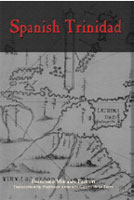 |
 |
 |
|
September 2013 |
Translation and re-publication of a classic text
Francisco Morales Padrón (Canary Islands, Spain 1923-2010) earned a Doctorate in History in 1952, taught at the University of Seville from 1958 to 1989 and was awarded Spain’s highest scholarly honour, the Royal Medal of King Alphonso X the Wise. His decades-long work in Spanish colonial archives produced several books illuminating the history of the Spanish West Indies. He wrote an unsurpassed history of Spanish Jamaica in 1952 and has complemented it with the book on Spanish Trinidad in 2011. The book Spanish Trinidad opens with the story of Columbus’s arrival on the island in 1498 and traces its history to the British conquest in 1797. Morales Padrón sheds light on the lives of the first peoples of Trinidad, their contact with the first Europeans on the island, the Spaniards, and later the arrival of African descendants who were instrumental to the economic and social development of Trinidad from the 16th to 18th centuries. Spanish Trinidad chronicles this history in the larger global currents of the time—the wars, diplomatic efforts, the trade and commercial networks that linked Trinidad to the world of by-gone centuries. The book depicts accounts of Catholic monks attempting to evangelise and transmit Spanish culture to Amerindians and the first rebellions against these attempts, as they tried to protect their way of life. Spanish Trinidad also narrates how throughout the 16th century, the Spaniards used the island as a springboard in their quixotic search for the mythical kingdom of El Dorado whilst defending it from Dutch, French, and British pirates who encroached and attempted to seize the island, with quite devastating effects. Stories of earthquakes, fires, invasions, and reconstruction and survival—and particularly the resilience of such towns as St. Joseph, the first capital of Spanish Trinidad and Port of Spain are illuminated in the book. Spanish Trinidad provides the reader with a wealth of previously forgotten original sources, letters and documents from Governors and island citizens. The book situates the history of Trinidad from 1498 to 1797 in a truly global context. Historical literature on Trinidad has focused on the British period of colonisation, the 19th century leading to independence and after 1962. Spanish Trinidad offers an opportunity to understand what happened earlier—of how Trinidadians of diverse backgrounds interacted and attempted to create a new Trinidad. The book Spanish Trinidad is a most valuable contribution to what Trinbagonians and the world know about this Caribbean nation from 1498 to 1797, nearly 300 years of the island’s history brought to life. Armando García de la Torre (PhD, History, Washington State University, 2006) is Lecturer and Researcher in Spanish and Latin American History at The University of the West Indies, St. Augustine campus, Trinidad and Tobago. His work focuses on the Spanish period of the Caribbean in a global context. He edited and translated Spanish Trinidad. |

 By Armando García de la Torre
By Armando García de la Torre